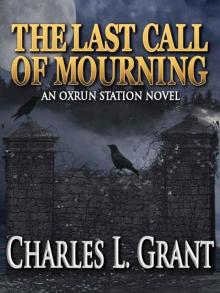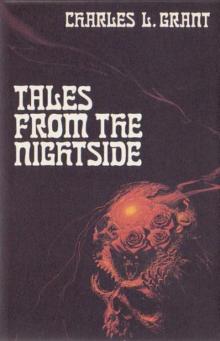- Home
- Charles L. Grant
Night Songs Page 4
Night Songs Read online
Page 4
She signed, her gaze shifted, and the ghost vanished.
To her left she could see the small fishing fleet moving ponderously homeward. Just over a half dozen boats, but they would work until November to drag the last of the harvest into their holds. Patiently. Confidently. Once each day drawing into a large circle for a laughing mealtime rendezvous if all was well, somberly trading well-worn and well-known gripes if their nets remained empty. Most had lived on the island since birth and could, if they'd a mind, trace their lineage back to the original inhabitants-brigands and smugglers and a few honest settlers, who lived on the island in an uneasy truce.
They fished, gossiped, and few ate what they carried back to Fox's Marina. Most of the catch was swiftly unloaded and packed into refrigerated crates, the crates labeled and thrown onto a truckbed for the mainland. What remained was sold to Naughton's Market or the Clipper Run. And if it were not worth the selling, it was thrown to the gulls.
The gulls that stalked them like winged hyenas.
Lilla watched them without a glimmer of caring, while the shadows of the trees behind the crumbling shack lanced toward the water, jabbed at the darkening sand. Shadows that would last until the night fog rolled it, riding low on the waves like a massive prowling beast, silently pacing the island in furtive spurts of roiling grey. It was treacherous even for the landed-blotting out the stars, defying the bright moon, sifting through the woodland to curl low in the streets, scrape noiselessly at chilled panes, fade the streetlamps one by one to slow sifting spots of diffused white haze.
Suddenly, there was a man walking along the beach. His topcoat was open, his hat back on his head, and his shoes were carried in one listless hand. He walked all the way to the first boulder without looking at the shack, turned and started back, to the snow fence that ran from the last jetty to the woods, the division between private and public bathing. He passed a hand wearily over his forehead, walking with a peculiar gait not caused by the sand-rigid, deliberate, difficult to watch without wanting to help him. He stopped and lifted his left foot, tried to slip on a shoe and fell on his rump. He shook his head and looked skyward, then looked at his shoes and tossed them away. Rising slowly with hands outstretched for balance, he dusted sand from his trousers and moved on, swaying slightly.
She watched him without blinking. Her arms were braced at her sides, her knees pressed against the unpainted wall beneath the canted window. Hearing the rising high tide without listening to it; listening instead to the calm rhythm of her heart. And when it was clear there was no panic to ruin what she'd done, she closed her eyes tightly and hugged herself snugly.
It would be so easy, she thought, to find Warren Harcourt and join him in his drinking. And it would be so temptingly easy to believe that belonging to the only black family on Haven's End had denied her grandfather all the care he'd needed. Too easy. Like running away with Harcourt. Like ignoring the fact that nothing could have saved Gran, nothing at all could have kept his lungs from stalling, his heart from failing. Ninety-seven years he had lived, and he had simply and finally worn himself out with his liquor and his smoking and his constant praying for that one little miracle that would bring him his fortune.
Dead now, when she needed him most.
Dead now, while men like Warren Harcourt stumbled on so damned worthless.
Dead. Gran had been her family, and he'd left her alone.
***
When she was sixteen, she had decided that either law or medicine would fill the rest of her life. No one in her family had ever been to college before, she would be the first, and she was going to do it right. Her parents applauded. Gran grumbled and told her he could teach her all she had to know, and she kissed his knotted brow, and whispered a laugh in his ear. Peg agreed to help wherever she could, and Little Matt promised to help her study very hard. And Colin her Knight (though he didn't know he had her armor) wrote to people he knew in hopes of snaring a scholarship or two.
When she was sixteen, the boys hung around her shyly, knowing her color and wanting her just the same. Instead of Peg, she asked Colin to help sort out her feelings, not because he was smarter but for the way he wouldn't look at her when he talked.
It was grand at sixteen, and with little ego involved she knew she was smart, she was pretty, she was ready for the world.
When she was sixteen, she and Gran had persuaded her parents to take a day off from running the Neptune Luncheonette. She assured them it would not fall apart or burn down or blow away while they were gone. When they hesitated, Gran scolded them lightly in Caribbean patois. They'd laughed and agreed, and rented a small boat from the marina to sail beyond the breakers.
In taking over the store, she had celebrated by treating every child to free ice cream sodas. And it was a celebration-the first full day the elder D'Grous had taken off since she could remember. Even during winter, when most shopowners fled for a three-month respite, they stayed. There was always work after the motels closed, and they felt more secure here, where there was no time for bigotry, or the mainland's tacit harassment.
By noon she was exhausted. A pleasant, high-flying weariness had her flirting, laughing, singing Caribbean songs old Gran had taught her when Mother wasn't around to disapprove of the choice.
She wore her grandfather out.
At five past two, Patrolman El Nichols walked in, and ten minutes later she was in the back room weeping in Gran's arms.
One of the fishermen had started back to the marina for repairs on his engine. On the way he found the sailboat, capsized after a noontime squall. There was no sign of the D'Grous.
When she was sixteen, Gran walked her to the house at the end of Atlantic Terrace where they drew the curtains, turned off the lights, refused to answer the telephone's pleading.
For weeks after the dying, the funeral without bodies, he had stayed, cleaning and cooking, promising all would be fine.
"You know, girl," he said one night at the table, "your old mother was the best woman I know, the best daughter there ever be. But she think I'm a little-" And he drew a circle around his temple and laughed quietly. "She don't remember the island, the other one. She was still very small, too small to walk, when…"
He stopped, and Lilla watched his eyes as they followed his mind away from Haven's End.
"Much sickness," he said softly. "I tell your Gram we have to leave, go to the Big Place and be rich. But she died, you see. Then I have… small trouble and come*too, with your mother."
"Gran, why didn't Momma want you to sing me the old songs?"
His look, then, was almost ferocious.
"Because," he said after too long a time, "she don't remember the true island and the things it can do. She likes it here and she wants you to grow up to be just like her."
"I want to, Gran."
"And I, girl. I promise your mother I give you this chance."
But he had promised her, too, her parents would come back, and they never did.
And he had promised he would guard her-and he'd died last week. The last of her family, when she needed him the most. When she needed him to tell her what to do with the store, her life, the lure of the mainland and all that lay beyond.
He had fallen ill just after Labor Day. He lay on the bed in the shack's back room and hadn't risen again. Instead, he spent long hours, the night hours, telling her of his boyhood on the Caicos Islands, north of Haiti. Very little made sense because he rambled on so much, whispered more often than not, broke into songs he demanded she learn. But his hoarse singing entranced her, until she sang with him, seeing him smile, nodding when she was able to complete a song on demand.
And on the day before it was over, it seemed as if he had found a way to slip into her mind. One moment she was kneeling by the bed, watching his breathing slow and stutter, and the next he was in there-in there -whispering to her, easing her slight panic with a cloak of comforting fog.
He would never leave, he said, if she did what he commanded.
He w
ould never leave if she would obey all his instructions.
And she believed him, even though his eyes remained closed, his lips did not move, and the rise and the fall of his chest became increasingly shallow.
She slept that night in the shack, had been standing at the front window just like this when his breathing stopped and he'd left her. Just like this when she'd realized what happened and raced to the back, where the walls were bare and stained an ugly rust-brown from splotches of dead insects and nails from patches where the roof had leaked. A single window at the rear was closed against the night, covered with an uneven blanket faded from green to streaked white. One chest of drawers squatted timidly in the far corner. Beside it, a chipped oak table held a hurricane lamp whose low flame wavered though there was no draft.
And in the center of the uncarpeted floor was the bed-a cheap imitation brass frame and headboard that cradled a thin, linenless mattress at an uncomfortable angle.
The man lying there was extraordinarily slender. Naked. Not a square inch of dark flesh unmarked by lines here deepened into crevices, there laced across withered and flaked skin drawn around sticks that played at being bones. Like a man immersed too long in salt water. Sexless. Rigid. Eyes wide and staring.
She had circled the bed once, not touching, not seeing. Then she'd knelt on the floor and taken Gran's hand. Snakeskin. She had pressed it to her chest, trembled, wept until she could rub her tears into the insensitive palm while she strained and willed the eyelids to blink, the chest to rise, the knees to flex. Just once. Please, just once. That's all she asked. That's all she demanded.
She willed and wept and trembled until the green-chimneyed lamp with its tarnished brass base sputtered, flared, and died. From rents in the blanket came the waxing new moon's gray-white intrusion. From the cracks in the walls, in the ceiling, in the air, the muted thunder of the cresting tide. She wept, rocking on her knees, pressing the hand hard into her flesh and feeling no pain.
"Gran, come back to me," she whimpered between sobs. "Gran, please. Don't leave me alone, not now when I need you."
The floor creaked rhythmically. The moon began to dim as the night fog returned.
"Gran, listen," she whispered earnestly.
A bloated brown spider walked over the old man's shin.
"Gran, listen, please don't go. Please, Gran? Gran?"
She spread the dead man's fingers until the skin between was taut, near to tearing, took the thumb into her mouth and bit down slowly, not too hard-she wouldn't have him screaming. She lifted her head to glare at the night; to curse the dark and the fog and the moon and the stars; to curse the sea and the island and the shack where she knelt.
The faint cry of a gull, the scrabbling of a rat, the rubbing of sawgrass like the husk of a ghost.
And her voice was a woman's ten times her age. "I won't let you go, Gran. You're all I have, and I won't let you go."
For a long moment there was a last bit of fear and a brief troubled wondering if her mind had let go. Then she took a deep breath and held it until her lungs were aching. She released it in slow spurts and in doing so released her hold on the shack, on the beach, on the island in the ocean. There was only Gran now, and the old songs, herself in a universe of slow-stirring shadows.
The Atlantic spoke, and she listened; the fog whispered, and she cocked her head; the lamp hissed, and she nodded.
Carefully, moving as if dealing with cold, fragile black crystal-do now all I tell you, child, do it all now and it will all come right-she positioned his hands over his sunken stomach, one above the other, the fingertips angled toward the shoulders. She did not close the blind eyes-she wanted him to see everything so he could correct her mistakes. If she made a mistake. But she would not, dared not. Not now. Not now.
The Atlantic; the fog; the eye of the lamp. The creaking of the shack; the dead silence of the moon.
She moved on her knees to the foot of the bed, her hands in position to mirror Gran's exactly.
A last thought that momentarily brought life to the brown eyes: is this what they taught you in school, is this what you learned from Colin and the others, is this what you believe in, is this sane… is it… sane… is this…
The sea whispered.
The thought died.
"I will sing you, Gran," was a prayer and a query, and her voice filled the shack though its volume was low, the words swooping like ravens, darting like hawks, waiting like predators on the dead man's heart. Without joy, without promise, but a hard hopeful urging that surged to match the tide and hold, hold, until the words became a humming that lasted until dawn.
The words Gran had taught her to call on his gods.
And when she had finished and had slept for an hour, she started again.
For five days she worked at the luncheonette until seven, then returned to the shack where she ate, slept, and passed the night singing-staring at the cheap decanter she'd bought at Peg Fletcher's. There was gleaming red liquid in the cut-glass container, and each night a little more.
Five days later she walked into the police station and told them Gran was dead.
***
Dead.
And she didn't notice the way people looked at her now-except during those brief moments when the mind fog lifted and she wondered where she was.
A movement. Her eyes shifted. There. There on the water. Seven longboats making their way south just beyond the breakers. Dark against the sea, the figures within black in their slickers. She blinked rapidly to drive off the hazy past, and saw the people on the beach. Only a few yet, but a few more stumbling down the dunes; not one of them looked in her direction.
The boats turned, pitched, and rolled as they crested the waves and made their way toward shore.
She searched for Colin. Of all the people for all this time, only he understood what magic Gran had had in his fingers, in his soul, to bring to life the driftwood and the pine. He'd helped Gran sell, asking nothing in return, had helped deal with the big city galleries that came sniffing around the shack, hands on their wallets and handkerchiefs to their noses. Gran, however, refused most of Colin's assistance. More often than not he gave the sculptures away, then complained bitterly into his bottle about the few dollars he'd saved. And the closer to death he came, the angrier he grew, lashing out at the island without once ever taking any blame for his failures on his own frail shoulders.
She seemed to recall, then, that the songs he had taught her while he lay on the bed were angry as well. But it was only a feeling, one she could not pin down.
She shivered and hugged herself more tightly.
The afternoon before, Colin had visited her when school was over, having heard through the grapevine that she didn't want Gran buried in the sea despite the fact it was Haven's End's way.
She had met him on the sand, away from the shack.
"Lil, it's all right, y'know," he'd said, hands thrust into his pockets, brown hair caught in the sea breeze. "If you don't want to do this, it's all right."
She shook her head slowly. "You don't understand, Colin."
He managed a smile. "I'm trying." His look said, why don't you help me?
She felt a swirling of the mind fog that had blinded her since the night before Gran died. "It's not a matter of want, it's a matter of must." And she hoped she wasn't overplaying the bereaved role, one she sometimes felt wasn't a role at all. Whenever that feeling came she knew Gran was listening, watching, waiting to stop her. Then the feeling would leave and the fog would come again.
"Lilla… Lilla, I'm sorry."
"It's all right."
"I'm still sorry."
She found herself smiling.
A gull shrieked, and veered sharply away toward the water.
He'd looked to the sea, down to the sand, raised his eyes without lifting his head. "Lil, are you all right? I know this isn't easy for you, but… are you all right?"
She'd wanted to tell him then; the singing, the nights, the fog stalking her dreams. B
ut she couldn't. Do all I tell you, child, and it will all come right. She would have to let them do what they wanted without saying a word.
Then she would do what she must.
***
There were more people on the beach. They took hold of the longboat's gunwales and dragged them from the surf, hauled them around to face the way they'd come. Cigarettes and a thermos jug of coffee were passed around. Faces, small and pale, were checking the sky as if sniffing the wind. There were no children, and only a handful of teenagers.
Lilla's eyes closed slowly, and she wished Peg were here to hold her, to whisper something to make her feel right, and smile.
She wished Gran were here. The real Gran. The grumbling and mumbling and whittling and bitching Gran. Not the Gran who lay so maddeningly still there in the back room.
Her eyes opened, and she sighed.
Any moment now they would come to take him away. Any moment now Colin and someone else, perhaps Chief Garve Tabor, would climb over the last dune, talk a little, see who was down there and who had stayed away, and then do what they had to do. Colin, who didn't know Lilla would have given every one of her eighteen years if he'd taken her to his bed just once before that man… that man at the college… that man who'd given her all that horrid stuff to drink and had brought her back to his room and had… that man… who'd made a bet that black women were different where a white man thought it counted.
That man.
At the beginning of last August a full year ago, over Gran's protests, she had gone to the college for a weekend's orientation.
That man-his name and face gone, leaving only his expression when she returned the next day and spat in his eyes before heading for the Registrar to withdraw her name from the rolls.

![[Oxrun Station] The Orchard Read online](http://i1.bookreadfree.com/i/03/17/oxrun_station_the_orchard_preview.jpg) [Oxrun Station] The Orchard
[Oxrun Station] The Orchard![Riders in the Sky - [Millennium Quartet 04] Read online](http://i1.bookreadfree.com/i/03/20/riders_in_the_sky_-_millennium_quartet_04_preview.jpg) Riders in the Sky - [Millennium Quartet 04]
Riders in the Sky - [Millennium Quartet 04]![Chariot - [Millennium Quartet 03] Read online](http://i1.bookreadfree.com/i/03/19/chariot_-_millennium_quartet_03_preview.jpg) Chariot - [Millennium Quartet 03]
Chariot - [Millennium Quartet 03] The Universe of Horror Volume 1: The Soft Whisper of the Dead (Neccon Classic Horror)
The Universe of Horror Volume 1: The Soft Whisper of the Dead (Neccon Classic Horror)![[Oxrun Station] Dialing The Wind Read online](http://i1.bookreadfree.com/i/03/19/oxrun_station_dialing_the_wind_preview.jpg) [Oxrun Station] Dialing The Wind
[Oxrun Station] Dialing The Wind The Universe of Horror Volume 3: The Long Night of the Grave (Neccon Classic Horror)
The Universe of Horror Volume 3: The Long Night of the Grave (Neccon Classic Horror) The Grave - An Oxrun Station Novel (Oxrun Station Novels)
The Grave - An Oxrun Station Novel (Oxrun Station Novels) The Last Call of Mourning - An Oxrun Station Novel (Oxrun Station Novels)
The Last Call of Mourning - An Oxrun Station Novel (Oxrun Station Novels) The Complete Short Fiction of Charles L. Grant, Volume IV: The Black Carousel
The Complete Short Fiction of Charles L. Grant, Volume IV: The Black Carousel The Bloodwind - An Oxrun Station Novel (Oxrun Station Novels)
The Bloodwind - An Oxrun Station Novel (Oxrun Station Novels) The Curse
The Curse The Complete Short Fiction of Charles L. Grant Volume 1: Nightmare Seasons (Necon Classic Horror)
The Complete Short Fiction of Charles L. Grant Volume 1: Nightmare Seasons (Necon Classic Horror) The Universe of Horror Volume 2: The Dark Cry of the Moon (Neccon Classic Horror)
The Universe of Horror Volume 2: The Dark Cry of the Moon (Neccon Classic Horror) Watcher: Based on the Apocalypse (World of Darkness : Werewolf)
Watcher: Based on the Apocalypse (World of Darkness : Werewolf)![[Oxrun Station] The Bloodwind Read online](http://i1.bookreadfree.com/i/03/25/oxrun_station_the_bloodwind_preview.jpg) [Oxrun Station] The Bloodwind
[Oxrun Station] The Bloodwind The Orchard
The Orchard Night Songs
Night Songs Shadows 3
Shadows 3![Symphony - [Millennium Quartet 01] Read online](http://i1.bookreadfree.com/i1/04/02/symphony_-_millennium_quartet_01_preview.jpg) Symphony - [Millennium Quartet 01]
Symphony - [Millennium Quartet 01] The Hour of the Oxrun Dead (Necon Classic Horror)
The Hour of the Oxrun Dead (Necon Classic Horror)![In the Mood - [Millennium Quartet 02] Read online](http://i1.bookreadfree.com/i1/03/31/in_the_mood_-_millennium_quartet_02_preview.jpg) In the Mood - [Millennium Quartet 02]
In the Mood - [Millennium Quartet 02] The Complete Short Fiction of Charles L. Grant Volume 3: Dialing the Wind (Neccon Classic Horror)
The Complete Short Fiction of Charles L. Grant Volume 3: Dialing the Wind (Neccon Classic Horror)![[Oxrun Station] The Last Call of Mourning Read online](http://i1.bookreadfree.com/i2/04/05/oxrun_station_the_last_call_of_mourning_preview.jpg) [Oxrun Station] The Last Call of Mourning
[Oxrun Station] The Last Call of Mourning The Pet
The Pet Tales from the Nightside
Tales from the Nightside The Tea Party - A Novel of Horror
The Tea Party - A Novel of Horror The Complete Short Fiction of Charles L. Grant Volume 2: The Orchard (Necon Classic Horror)
The Complete Short Fiction of Charles L. Grant Volume 2: The Orchard (Necon Classic Horror) Whirlwind
Whirlwind Jackals
Jackals The Sound of Midnight - An Oxrun Station Novel
The Sound of Midnight - An Oxrun Station Novel